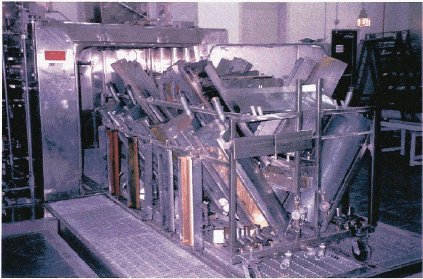Parts Washer
|
|
SRS Designed Equipment manufactures press parts cleaning systems including printing press component washers and flexographic off press washing systems. These systems are specifically designed for the converting industries.
These washer systems are stainless steel enclosures designed to wash most printing press components, including coating pans, doctor blades, ink pots, hoses, pumps and press cylinders. The high efficiency of these systems is due to the use of unique removable carts, specifically designed to wash parts from a series of nozzles, both on the cart and in the base unit, which are strategically located as to cover all the surface areas to be cleaned.
Options are offered in the MW-Series of washers to allow them to be used in aqueous and solvent applications. Although many of our installations are installed using flammable solvents and solvent blends, others are using Acextra MPC, which is suitable for both solvent and water based inks, and have high flash points for safety and emission control.

| MW-Series NW-Series |
Wash Chamber | Application |
| NW-36 | 36″ x 36″ x 36″ | Narrow Web |
| MW-200 | 5′ x 6′ x 8′ | Press Parts to 7′ Long |
| MW-300 | 5′ x 6′ x 12′ | Press Parts to 11′ Long |
| MW-1000 | 8′ x 8′ x 8′ | Press Parts to 7′ Long |
| MW-2000 | 8′ x 8′ x 12′ | Press Parts to 11′ Long |
| Wash Baths | Various | Parts, Pumps, Hoses, etc…. |
An Introduction to SRS DE’s Press Parts Wash System
First: Only three components to install. A Wash Chamber, a Dual Wash/Rinse Tank and a high out-put Distillation Unit.
Second: Simple cleaning operation. Wash solution is drawn from the wash portion of the Dual Tank, sprayed at high pressure/high volume, through wash nozzles on side walls and from the cart and is scavenged back to the Dual Tank on a continuous base. Rinse solution is drawn from the rinse portion of the Dual Tank through separate nozzles and it is scavenged back to the Dual Tank. Alternated chilled and heated air is circulated throughout the wash chamber facilitating the drying of the parts and minimizing VOC exhausting.
Finally: Automatic solution re-generation. The Distillation unit draws spent wash solution from the cone bottom of the Dual Tank, distills the solution under vacuum, to the rinse portion of the dual tank providing a supply of rinse solution. Excess distilled solvent overflows into the wash portion of the Dual Tank diluting the wash solution so that it never gets too dirty to wash with. Temperature sensing of the residue provides safe distillation of Nitrocellulose waste to a pump-able waste.





